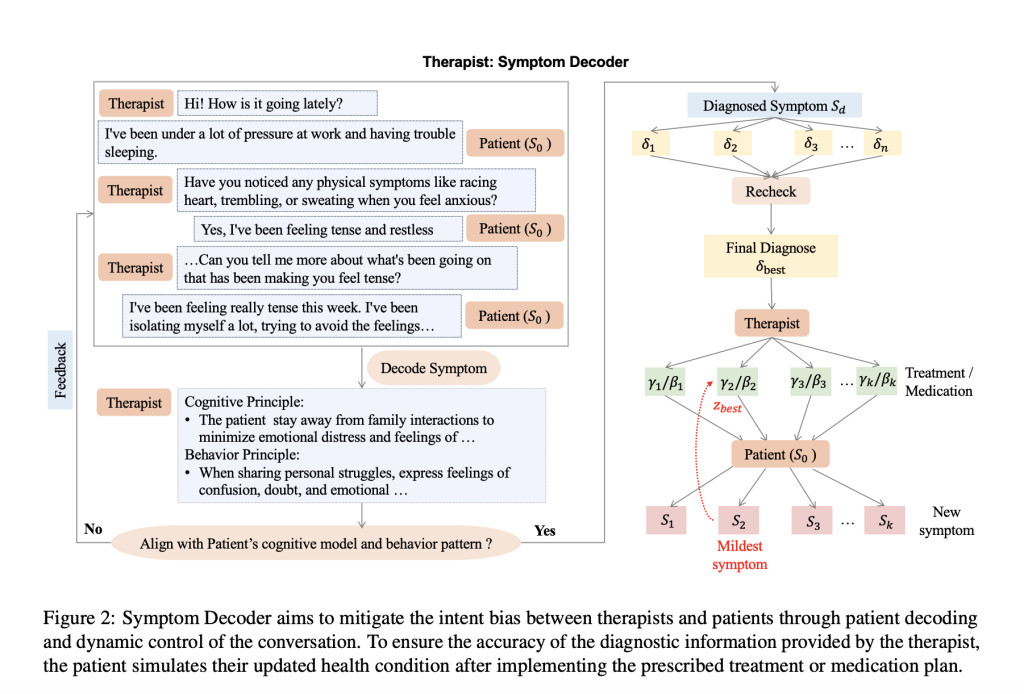In today’s fast-paced and interconnected world, mental health is more important than ever. The constant pressures of work, social media, and global events can take a toll on our emotional and psychological well-being. Mental health, being so important, is not paid attention to over other global problems. While mental health disorders like anxiety, depression, and schizophrenia affect a vast number of people globally, a significant percentage of those in need do not receive proper care due to resource limitations and privacy concerns surrounding the collection of personalized medical data. Researchers in both medical and technology make many attempts to democratize mental support and to create effective machine-learning models for diagnosing and treating mental health disorders.
The current AI-based mental health systems rely on template-driven or decision-tree-based approaches, which lack flexibility and personalization. These models are trained on data collected from social media, which introduces bias and may not accurately represent diverse patient experiences. Moreover, privacy concerns and data scarcity hinder the development of robust models for mental health diagnosis and treatment. Even the NLP models struggle to understand nuances in language, cultural differences, and the context of conversations.
To address these issues, a team of researchers from the University of Illinois Urbana-Champaign, Standford University and Microsoft Research Asia developed a self-play reinforcement learning framework, MentalArena, which is designed to train large language models (LLMs) specifically for diagnosing and treating mental health disorders. The method generates personalized data through simulated patient-therapist interactions, allowing the model to improve its performance continuously.
MentalArena’s architecture consists of three core modules: the Symptom Encoder, the Symptom Decoder, and the Model Optimizer. The Symptom Encoder converts raw symptom data into a numerical representation, while the Symptom Decoder generates human-readable symptom descriptions or recommendations. The Model Optimizer improves the performance and efficiency of the overall model through techniques like hyperparameter tuning, pruning, quantization, and knowledge distillation. The framework aims to mimic real-world therapeutic settings by evolving through iterations of self-play, where the model alternates between the roles of patient and therapist, generating high-quality, domain-specific data for training.
The study evaluates MentalArena’s performance across six benchmark datasets, including biomedical QA and mental health detection tasks, where the model significantly outperformed state-of-the-art LLMs such as GPT-3.5 and Llama-3-8b. Fine-tuned on GPT-3.5-turbo and Llama-3-8b models, MentalArena showed a 20.7% performance improvement over GPT-3.5-turbo and a 6.6% improvement over Llama-3-8b. Notably, it even outperformed GPT-4o by 7.7%. MentalArena demonstrated enhanced accuracy in diagnosing mental health conditions, generating personalized treatment plans, and strong generalization abilities to other medical domains.
In conclusion, MentalArena represents a promising advance in AI-driven mental health care, addressing key challenges of data privacy, accessibility, and personalization. By effectively combining the three modules, MentalArena can process complex patient data, generate personalized treatment recommendations, and optimize model performance for efficient deployment. MentalArena has enabled the generation of large-scale, high-quality training data in the absence of real-world patient interactions, which opens new possibilities for developing effective, scalable mental health solutions. The research also highlights the potential for generalizing the framework to other medical domains. However, future work is needed to refine the model further, address ethical concerns like privacy, and ensure its safe application in real-world settings.
Check out the Paper. All credit for this research goes to the researchers of this project. Also, don’t forget to follow us on Twitter and join our Telegram Channel and LinkedIn Group. If you like our work, you will love our newsletter.. Don’t Forget to join our 50k+ ML SubReddit.
[Upcoming Live Webinar- Oct 29, 2024] The Best Platform for Serving Fine-Tuned Models: Predibase Inference Engine (Promoted)
The post MentalArena: A Self-Play AI Framework Designed to Train Language Models for Diagnosis and Treatment of Mental Health Disorders appeared first on MarkTechPost.
Source: Read MoreÂ

![Why developers needn’t fear CSS – with the King of CSS himself Kevin Powell [Podcast #154]](https://devstacktips.com/wp-content/uploads/2024/12/15498ad9-15f9-4dc3-98cc-8d7f07cec348-fXprvk-450x253.png)